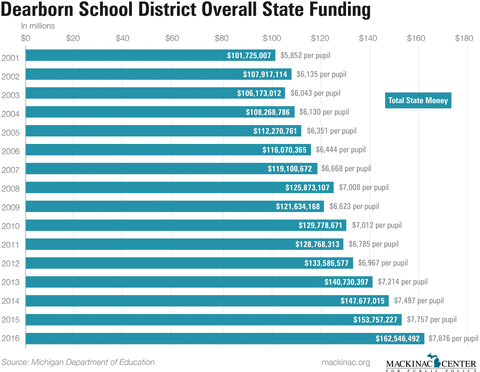Dearborn School Superintendents And Budget Tales
In a video posted on the Dearborn school district’s website, Superintendent Glenn Maleyko discussed the school budget — and the conversation deserves a closer look.
Maleyko talked about the complications involved in school funding as well as the impact that pensions costs have on the budget.
The district’s payments to the Michigan Public School Employees Retirement System plan increased from $19.4 million in 2011 to $33.0 million in 2016, according to the city’s audited budget.
Maleyko recalled a conversation he had with two of his predecessors, and his remarks implied the school district was getting less than it did 10 to 15 years ago — up to $30 million a year less. But the claim isn’t accurate.
In the video (starting after the 8:09 mark), Maleyko said he was at an event with John Artis and Brian Whiston. Artis, who was superintendent from 2002 to 2008, was replaced by Brian Whiston, who left in 2015 to become state superintendent. Maleyko then took over.
Maleyko said that Artis told him the district’s general fund revenue was $30 million higher in his tenure than it was under Whiston. Further, Artis said, the district under Whiston had 2,000 extra students.
Under Michigan’s school finance system, state funding for districts is based on enrollment. So if a district gains 2,000 students and still gets less money overall, a drop in revenue would imply a significant drop in the amount it gets for each student.
Maleyko’s comment was about the district’s general fund budget, which is a combination of local, state and federal funding that goes to pay for daily operations.
Reports submitted by school districts to the Michigan Department of Education do not claim that the general fund of the Dearborn school district went down by $30 million after Artis left.
According to the department’s Bulletin 1014, Dearborn's general fund budget in 2001-02, when Artis was in his first year as superintendent, was $9,900 per pupil. When he left in 2007-08, it was up to $10,906. In Whiston’s last year, 2014-15, the district’s per pupil money in the general fund was $10,479. That was $427 less than in 2008, the year Artis left.
On a per-pupil basis, the general fund did go down under Whiston. But since the district had 1,838 more students in 2015, it would have, under the state formula, received about $12 million more in general fund revenues — not $30 million less.
Furthermore, Dearborn’s general fund numbers should be put in proper context.
When Whiston left in 2014-15, the district received $10,479 in general fund revenues for each student. That was $1,042 more than the state average.
And while Maleyko’s comments were about the general fund, the school district receives other money as well.
Total funding from the state is about $54 million a year more in 2016-17 than when Artis first took over in the 2001-02 year. That’s in part because the district has 3,254 more students. And despite an occasional reduction in the per-pupil amount, the trend has been upward.
For example, in 2001-02, Dearborn received $5,852 per pupil in state funding, for a total of $101.7 million. This year, Dearborn received $7,876 per pupil, for a total of $162.5 million.
If inflation is factored in, that 2001-02 funding comes out to $7,863 per pupil, which means the district is getting about $13 more per pupil today than it did 15 years ago. Not much, but not a cut, either.
The amount each district gets is based on a complex formula based on the local school tax levels that were in place when the current funding system was created by Proposal A in 1994. Dearborn was one of a small number of districts, all with higher spending and higher local taxes than most, that were excluded from the regular formula. That fact accounts for Dearborn’s current above-average funding. Most but not all Michigan school districts have received substantial dollar-per-student increases since the state's economy began turning around.
Michigan Capitol Confidential is the news source produced by the Mackinac Center for Public Policy. Michigan Capitol Confidential reports with a free-market news perspective.



 Whitmer hails historic school aid budget; her own party pushes back
Whitmer hails historic school aid budget; her own party pushes back
 Michigan’s school funding amendment is a harmful relic
Michigan’s school funding amendment is a harmful relic
 Whitmer claims historic investment in student mental health resources
Whitmer claims historic investment in student mental health resources